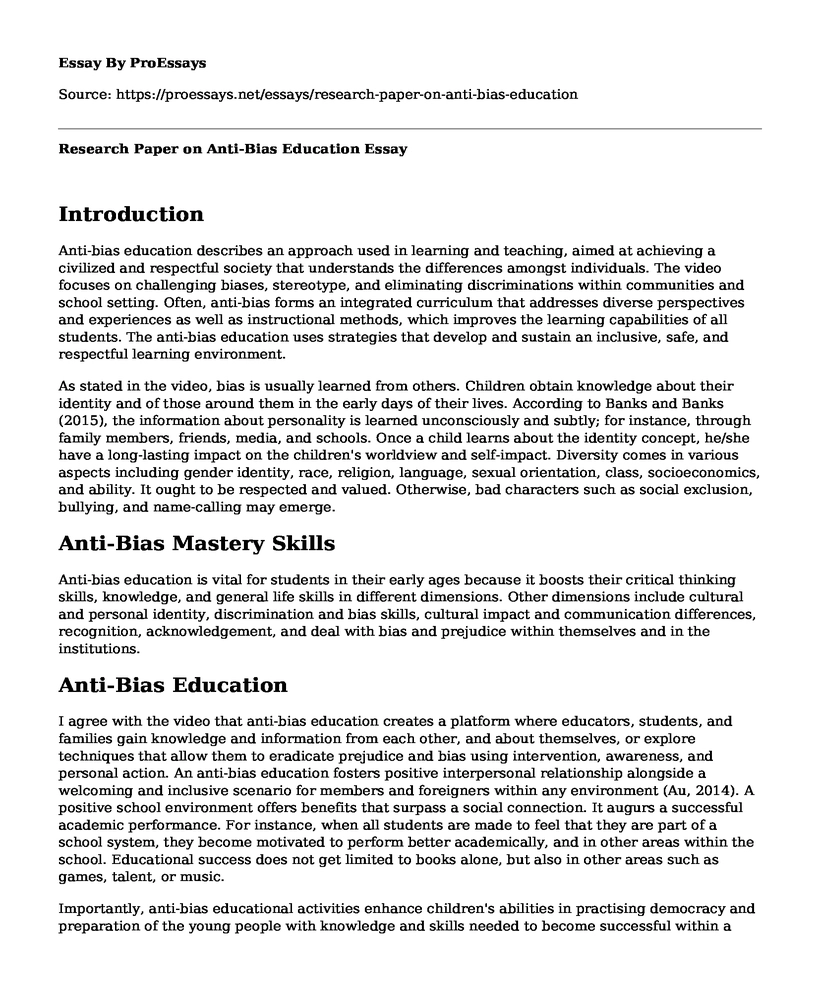Introduction
Anti-bias education describes an approach used in learning and teaching, aimed at achieving a civilized and respectful society that understands the differences amongst individuals. The video focuses on challenging biases, stereotype, and eliminating discriminations within communities and school setting. Often, anti-bias forms an integrated curriculum that addresses diverse perspectives and experiences as well as instructional methods, which improves the learning capabilities of all students. The anti-bias education uses strategies that develop and sustain an inclusive, safe, and respectful learning environment.
As stated in the video, bias is usually learned from others. Children obtain knowledge about their identity and of those around them in the early days of their lives. According to Banks and Banks (2015), the information about personality is learned unconsciously and subtly; for instance, through family members, friends, media, and schools. Once a child learns about the identity concept, he/she have a long-lasting impact on the children's worldview and self-impact. Diversity comes in various aspects including gender identity, race, religion, language, sexual orientation, class, socioeconomics, and ability. It ought to be respected and valued. Otherwise, bad characters such as social exclusion, bullying, and name-calling may emerge.
Anti-Bias Mastery Skills
Anti-bias education is vital for students in their early ages because it boosts their critical thinking skills, knowledge, and general life skills in different dimensions. Other dimensions include cultural and personal identity, discrimination and bias skills, cultural impact and communication differences, recognition, acknowledgement, and deal with bias and prejudice within themselves and in the institutions.
Anti-Bias Education
I agree with the video that anti-bias education creates a platform where educators, students, and families gain knowledge and information from each other, and about themselves, or explore techniques that allow them to eradicate prejudice and bias using intervention, awareness, and personal action. An anti-bias education fosters positive interpersonal relationship alongside a welcoming and inclusive scenario for members and foreigners within any environment (Au, 2014). A positive school environment offers benefits that surpass a social connection. It augurs a successful academic performance. For instance, when all students are made to feel that they are part of a school system, they become motivated to perform better academically, and in other areas within the school. Educational success does not get limited to books alone, but also in other areas such as games, talent, or music.
Importantly, anti-bias educational activities enhance children's abilities in practising democracy and preparation of the young people with knowledge and skills needed to become successful within a pluralistic environment. Pelo (2008) argues that today's society has become dynamic, thus requiring children to grow up appreciating others most so that they also get the same from the community. Students need quality education system that goes beyond social, physical, academic development. The inclusion of anti-bias education ensures that students get quality education so that they become responsible and focused citizens of a nation.
School Commitment Towards Anti-Bias Education
It is clear that anti-bias education requires the direct input of school systems, implemented in a proactive manner, where the anti-bias principles are integrated alongside the curriculum so that the policies, cultures, and pedagogy match. For example, a school is required to develop a comprehensive anti-bias educational plan that includes an anti-bias curriculum, and availing the needed resources to the educators. The staffs are then to undergo a professional development based on social-emotional learning and anti-bias education, to prevent any form of bullying among the learners. Importantly, schools ought to implement student leadership training and offer the learners appropriate opportunities, which develop their interpersonal and ally behaviours. Educational forums and events that target families are important for efficient school management. Moreover, these institutions ought to implement a culture that is based on inclusion and respect.
References
Au, W. (2014). Rethinking multicultural education: Teaching for racial and cultural justice. Milwaukee, WI: Rethinking Schools.
Banks, J., & Banks, C. (2015). Multicultural education: Issues and perspectives. Hoboken, N.J: Wiley.
Pelo, A. (2008). Rethinking early childhood education. Milwaukee, WI: Rethinking Schools.
Cite this page
Research Paper on Anti-Bias Education. (2022, Apr 02). Retrieved from https://proessays.net/essays/research-paper-on-anti-bias-education
If you are the original author of this essay and no longer wish to have it published on the ProEssays website, please click below to request its removal:
- Drugs Effect to the Brain Development of Teenagers
- Essay Sample on Elements of the Advert That Make Appealing Drunk Driving
- My Career Choice: Nursing Paper Example
- Essay Example on Venezuela: A Struggling Nation of Poverty and Culture Shock
- Essay on Student Affairs: Broadening Functional Areas for Student Success
- Essay Example on Child Behavior & Career Choice: Who Impacts More?
- Essay Sample on Developmentally Appropriate Practice: Enhancing Early Childhood Learning







